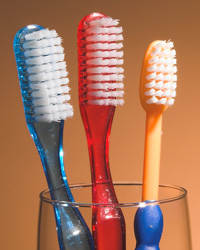Oral Health and Early Disease Detection
Most of your dentist's patients enjoy robust health, and he or she is thankful for that. In fact, if you are faithful about your "recall" appointments (regular check-ups) he or she probably sees you more often than your physician does. That means much more to him or her than finding a small cavity, or more than a chance to catch up on your comings and goings between visits.
As your primary dental health care provider, your dentist has a singular and weighty responsibility: early detection of disease. When he or she sizes up the health of your gums, tongue, neck, jaw, the mental check-list is long, he or she looks and feels. He or she "invisibly" observes your general health, head, skin, glands, sinuses (and teeth, of course).
What is your dentist looking for? Simply put, anything wrong. Among them: dry mouth, bacterial infections, any lesions on the mucous membranes, gum color and texture, soreness or ulcerations, you get the idea. It's important for you to share with your dentist any general health problems you may have noticed or changes in medications. He or she needs the whole picture.
Practicing preventive dentistry is very important. There are more than 200 known diseases of the oral cavity. Your dentist is on the look-out for all of them. Not only can an oral problem signal local trouble, but it may indicate something systemic, something throughout your body.
For this reason, your six-month recall visit may be the most important exam you have all year. If a cavity is found, that can be fixed. If evidence of something more serious is found, then you benefit from the advantage of early detection.
Your dentist and dental hygienist want all of their patients to take these exams seriously. A cavity or canker sore, after all, is one thing. Your whole health, quite another.

+Jim Du Molin is a leading Internet search expert helping individuals and families connect with the right dentist in their area. Visit his author page.
Healthy Smooching: Good Oral Hygiene Leads to Great Kisses
Whether you're preparing for holiday mistletoe or are just in the mood for some love, you're probably fully aware of the connection between the state of your mouth and the quality of your kisses. Still, a little reminder never hurt. Here's the skinny on getting lucky without embarrassment (from your mouth, anyway)!
Kick the Smoking Habit
I'm sure you're very familiar with the smoking lecture. Not only do tobacco products taste awful to your partner, but they put you at greater risk for oral cancer and periodontal or gum disease. Why put so much effort into knocking your sweetheart's socks off if you aren't going to be around to pick them up? If you don't kick the habit for your partner, do it for yourself.
Don't Chew Gum
The best smooches are spur of the moment, so it's best to be prepared for them. Besides, sugary gum can lead to tooth decay, AKA cavities. If you must chew gum (maybe you want your breath to be in top shape), choose a sugar-free variety like Xylitol.
Brush and Floss
Nothing leaves an impression like bad breath, but it's not the kind of attention you want. Besides, healthy white teeth will help you build confidence in your smile. Brushing your teeth and gums is a good start, but take it a step further and floss each night. You'll dislodge food particles and remove odor-causing, not to mention tissue- and tooth-destroying, bacteria. If you don't have your toothbrush handy after you eat, at least rinse your mouth out with warm water. There are also a number of handy little dental hygiene products available for great breath on the go.
Take good care of your partner by caring for yourself. If you find that your gums are exceptionally tender or swollen, or if you have habitually bad breath, make an appointment with your dentist. These could be symptoms of a more serious problem!

+Jim Du Molin is a leading Internet search expert helping individuals and families connect with the right dentist in their area. Visit his author page.










